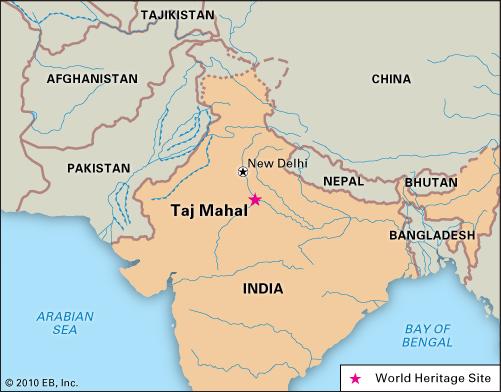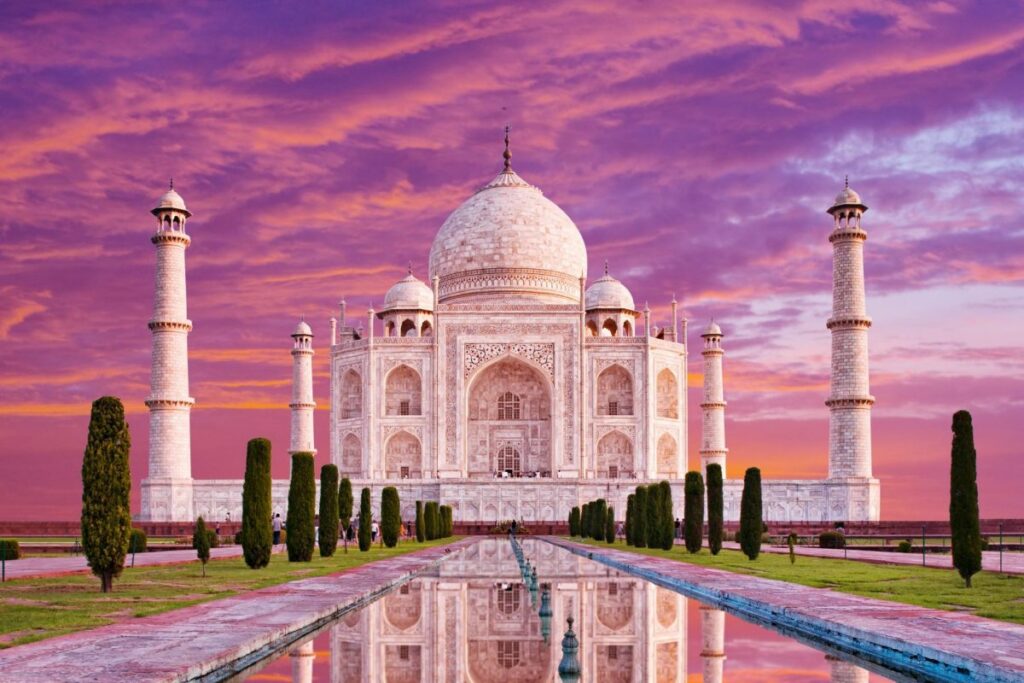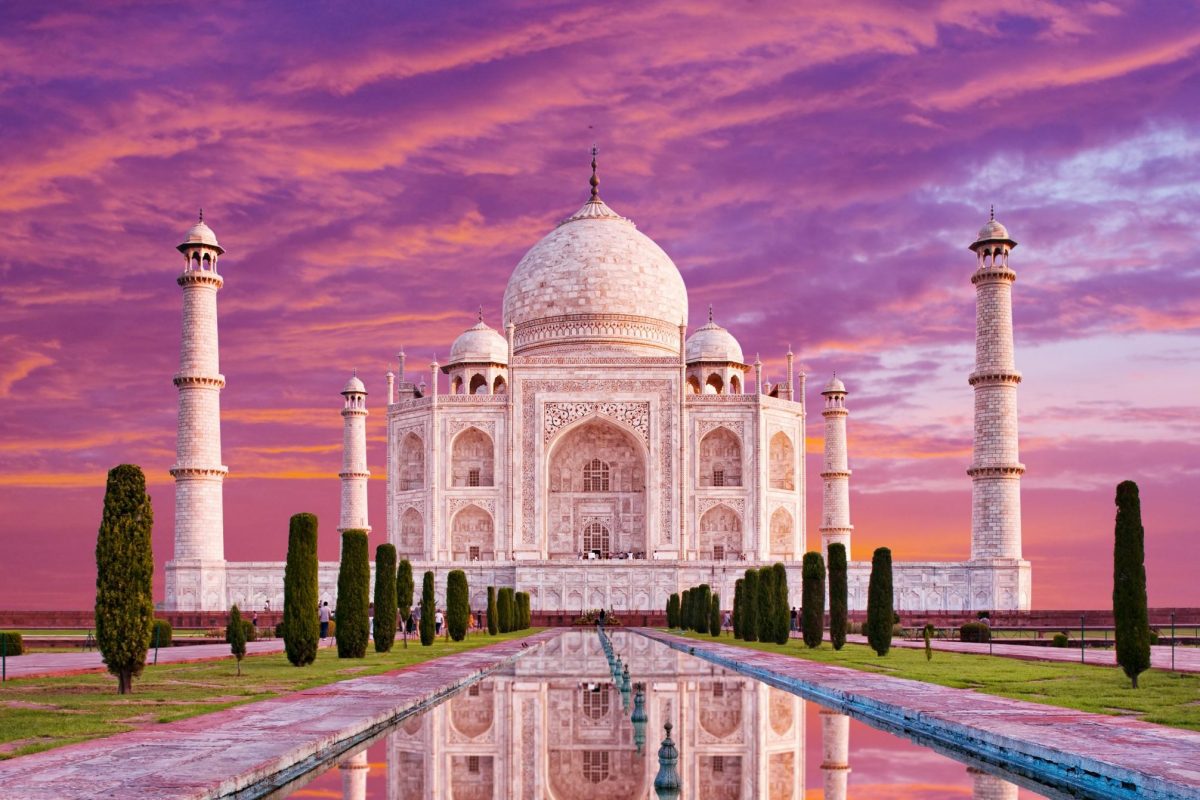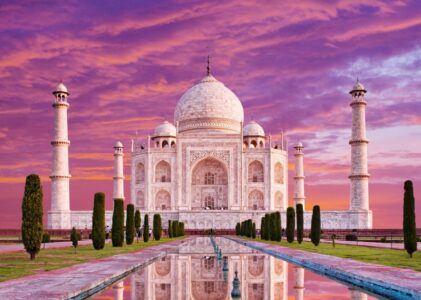1. Introduction
The Taj Mahal, an iconic symbol of love and architectural marvel, is located in Agra, India. Built by Mughal Emperor Shah Jahan in memory of his wife Mumtaz Mahal, this UNESCO World Heritage site attracts millions of visitors each year. This guide provides everything you need to know for a memorable visit, from historical insights to practical travel tips.
Discover more about Indian landmarks in our Travel Atlas guide to India.
2. History of the Taj Mahal
The Taj Mahal was commissioned in 1632 by Shah Jahan in memory of his beloved wife, Mumtaz Mahal, who passed away during childbirth. The construction of this magnificent mausoleum took approximately 22 years and was completed in 1653. The Taj Mahal represents the pinnacle of Mughal architecture and is a testament to the enduring love of Shah Jahan for his wife.
Historical Highlights:
- Commissioned: 1632 by Shah Jahan
- Completion: 1653
- Purpose: Mausoleum for Mumtaz Mahal
For more on the history, see the Taj Mahal Wikipedia page.

3. Architecture and Design
The Taj Mahal is renowned for its stunning Mughal architecture, characterized by its symmetrical white marble structure, intricate inlay work, and lush gardens. The main mausoleum is surrounded by four minarets, and its dome is a prominent feature that rises to 73 meters.
Architectural Features:
- Material: White marble with intricate inlay work
- Dome: 73 meters high, flanked by four minarets
- Gardens: Persian-style charbagh gardens
Learn more about Mughal architecture in our Architectural Wonders of India article.
4. Best Time to Visit the Taj Mahal
The best time to visit the Taj Mahal is during the cooler months from October to March. The weather during these months is pleasant, making it ideal for sightseeing. Avoid visiting during the summer months (April to June) due to the extreme heat.
Seasonal Tips:
- Peak Season (October-March): Pleasant weather, ideal for visiting
- Monsoon Season (July-September): Heavy rainfall, which can affect travel plans
- Summer (April-June): Very hot, less favorable for sightseeing
Check out our Best Time to Visit India for more details.
5. Visiting Hours and Ticket Prices
The Taj Mahal is open to visitors from sunrise to sunset, except on Fridays when it is closed for prayers. Ticket prices vary based on nationality, with foreign tourists paying a higher rate. It’s advisable to purchase tickets in advance to avoid long queues.
Ticket Information:
- Foreign Tourists: ₹1,100
- Indian Citizens: ₹50
- Entry: Included in the Agra Tourist Complex ticket
For current ticket prices and booking, visit the Taj Mahal official website.

6. Things to Do Near the Taj Mahal
While visiting the Taj Mahal, explore nearby attractions to make the most of your trip. Key sites include the Agra Fort, the Tomb of Itimad-ud-Daulah, and Mehtab Bagh, which offers a spectacular view of the Taj Mahal from across the Yamuna River.
Nearby Attractions:
- Agra Fort: A historic fortification with impressive architecture.
- Tomb of Itimad-ud-Daulah: Known as the “Baby Taj” for its resemblance.
- Mehtab Bagh: A garden offering a panoramic view of the Taj Mahal.
Explore these attractions in our Agra Travel Guide.
7. Photography Tips
To capture the beauty of the Taj Mahal, consider visiting early in the morning or late in the afternoon for the best lighting. The reflection of the Taj Mahal in the pool in front of the main entrance provides excellent photo opportunities.
Photography Tips:
- Best Time: Early morning or late afternoon for optimal light
- Key Spots: Main entrance, reflecting pool, and gardens
- Camera Settings: Use a tripod and adjust for low light conditions
For more photography tips, check our Photography Tips for India article.
8. Facts and Trivia
The Taj Mahal is not only a symbol of love but also a feat of engineering and artistry. Here are some interesting facts:
- Material: The white marble used was transported from Rajasthan.
- Engineering: The structure is designed to be perfectly symmetrical.
- Myth: It is believed that Shah Jahan planned to build a black Taj Mahal opposite the original, though this was never completed.
Learn more fascinating details on the Taj Mahal Facts page.

9. How to Reach the Taj Mahal
Agra is well-connected by train, road, and air. The Taj Mahal is located about 5 kilometers from Agra’s main railway station and can be reached by taxi or auto-rickshaw. The nearest airport is in Agra, with more international flights available from Delhi.
Travel Options:
- By Train: Agra Cantt. Railway Station is the closest major station.
- By Road: Accessible via National Highway 19 from Delhi.
- By Air: Agra Airport offers domestic flights; international travelers can fly into Delhi and drive to Agra.
For more travel tips, visit our Traveling to Agra guide.
10. Travel Tips and Recommendations
- Dress Code: Modest clothing is recommended as it is a religious site.
- Security: Follow the security guidelines at the entrance.
- Local Cuisine: Try local dishes in Agra, including the famous petha sweet.
For a comprehensive travel experience, check our Travel Tips for India guide.
11. Conclusion
The Taj Mahal remains one of the most exquisite examples of Mughal architecture and a must-visit destination for anyone traveling to India. Whether you’re drawn by its history, architecture, or the sheer beauty of the monument, a visit to the Taj Mahal is an unforgettable experience.
For more travel destinations and guides, visit the Travel Atlas homepage.


